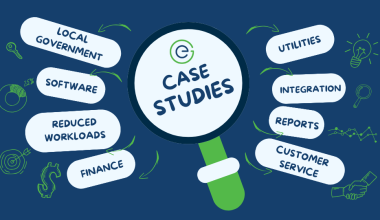When I first started in this business over 30 years ago, I worked for a computer service bureau. In the early days of computers, service bureaus provided computer time to other businesses on a rental basis. End users logged into mainframe computers with large monochrome terminals over leased data lines.
I’ve seen utility billing systems evolve from service bureaus to a series of in-house systems. Starting with proprietary minicomputers, then UNIX networks to Windows client-server networks and now to in-house web-based systems. I believe we are about to come full circle as hosted systems in the cloud become today’s equivalent of the 1970’s service bureau.
The term “cloud computing” is all the buzz in the media these days. So what is it all about and what does it mean for you?
What is cloud computing?
According to Wikipedia, “cloud computing is the delivery of computing as a service rather than a product, whereby shared resources, software, and information are provided to computers and other devices as a metered service over a network (typically the Internet)”.
Utility Information Pipeline #5 talked about cloud-based enterprise e-mails systems as an alternative to in-house e-mail systems. What about cloud-based utility billing systems?
From the perspective of utility billing systems, cloud computing means running the billing software in what is often called a hosted environment. In a hosted environment, both the software (in this case the billing application) and the information (the billing data) are stored on remote servers that are accessible via the internet.
In coming full circle from the original service bureau environment to the hosted systems of today, web servers replace mainframes, the internet replaces leased data lines and personal computers (or even tablets) replace bulky green-screen terminals.
What are the advantages of a hosted environment?
Hosted systems eliminate the need for in-house application servers. This saves the utility the initial purchase price of the server hardware and operating system software. It also saves the labor costs associated with ongoing server maintenance and upgrades.
Software upgrades are performed by the software vendor during downtime and don’t require any technical expertise by the utility to keep the system up-to-date.
Data backups are performed for you in a hosted environment and don’t require your staff to remember to swap backup media each day or take the latest backup offsite.
Most cloud computing environments rely on redundancy, eliminating downtime due to hardware failures or power outages.
Finally, a hosted environment is accessible anywhere internet access is available. Unlike in-house systems, which require a virtual private network (VPN) to access from outside your office, a hosted system is as close as the nearest internet connection. This can be very handy in the case of late night or weekend emergency calls if you don’t want to drive to the office to access your billing system.
Are there disadvantages to a hosted environment?
The only real disadvantage to a hosted environment is that it requires internet access. If internet access is unavailable, then the billing system is unavailable. This potential obstacle can be overcome by having a backup internet service provider or using cellular broadband access when your primary internet access is down.
Should you consider a hosted system for your next billing system?
If you have questions about computing environments or if you think a hosted environment might be right for your utility, please contact us to learn more about how a business review might assist you in making that decision.


